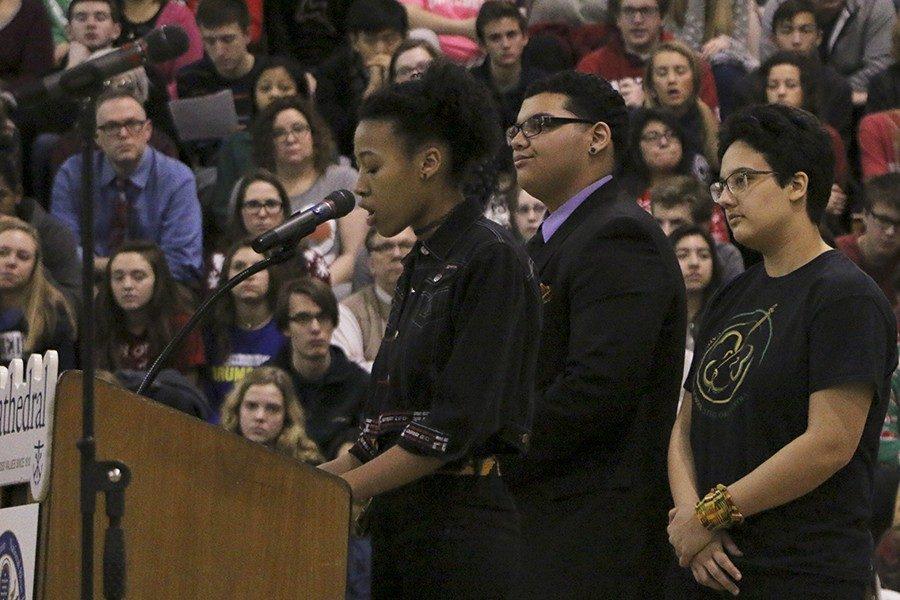Black History Month assembly reflects our country’s history
History of African Americans ignored says history teacher
Senior Michaela Ivory, junior Caige Harris and senior Bella Thomas present on the black influence on literature in the Black History Month Assembly during flex on Tuesday. There were several key African American authors discussed, including W.E.B. Du Bois, author of The Souls of Black Folk, and Alex Haley, the author of Roots.
While Valentine’s Day may be known as the most significant one-day holiday this month, February also is the month in which black history is celebrated. This year, the tradition continued with the school’s annual assembly to learn about and honor the achievements of African Americans.
This holiday is celebrated for many reasons. History teacher Sr. Mary Ann Stewart said all Americans celebrate this month because “up until the late 1960s or early 1970s, the history of African Americans was ignored, especially in U.S. history textbooks,” she said.
According to Sr. Stewart, the main African American mentioned was Booker T. Washington, at least in part because he did not challenge segregation and discrimination.
Recognition
Black History Month is about recognizing the integrity of African American accomplishments, and it is important to greater educate students about the past.
This occasion purposely takes place February. It was created in 1926 when the historian Carter G. Woodson and the Association for the Study of Negro Life and History stated the second week in this month as what then was called Negro History Week. That week was chosen because it coincided with the birthday of President Abraham Lincoln and the birthday of abolitionist Frederick Douglass.
Black communities have celebrated these two days together for at least three centuries. This ceremonial month is also an annual observance in both Canada and the United Kingdom. The months of celebration are February and October, respectively.
The lions, the hunters, the stories
Mr. Ken Barlow ‘82, vice president for community relations and diversity, shared a significant quote, “There is an African proverb that says: ‘Until the lions start writing down their own stories, the hunters will always be the heroes.’”
Some of these “lions” include black physicist Katherine Johnson, the Buffalo Soldiers and civil rights activist Fred Shuttlesworth, as well as the Tuskegee airmen who served their country during World War II.
Almost all schools nationwide, including this one, celebrate Black History Month. However, a full month was not always given to this celebration.
Sr. Stewart, reflecting on her own experiences, said, “There was no Black History month when I was in school, but interest in black history was beginning to pick up. I started reading Ebony magazine articles on people like Frederick Douglass.”
Barlow also had a similar experience. He said, “I don’t recall any formal recognition of Black History Week or Black History Month in school during my high school years.” Considering Barlow graduated in 1982, Black History Month is a fairly new event, given the nation’s 240-year history.
Recent work
Thanks to recent movements such as Black Lives Matter, Black History Month could have an even greater impact for many years still to come.
Sr. Stewart said, “I heard on the news that the Ten Point Coalition of black leaders under (the) Rev. Charles Harrison is receiving an award from the FBI for their work in reducing violence in Indianapolis. That may focus more interest in the cooperation between the police and the African American community in our city.”







